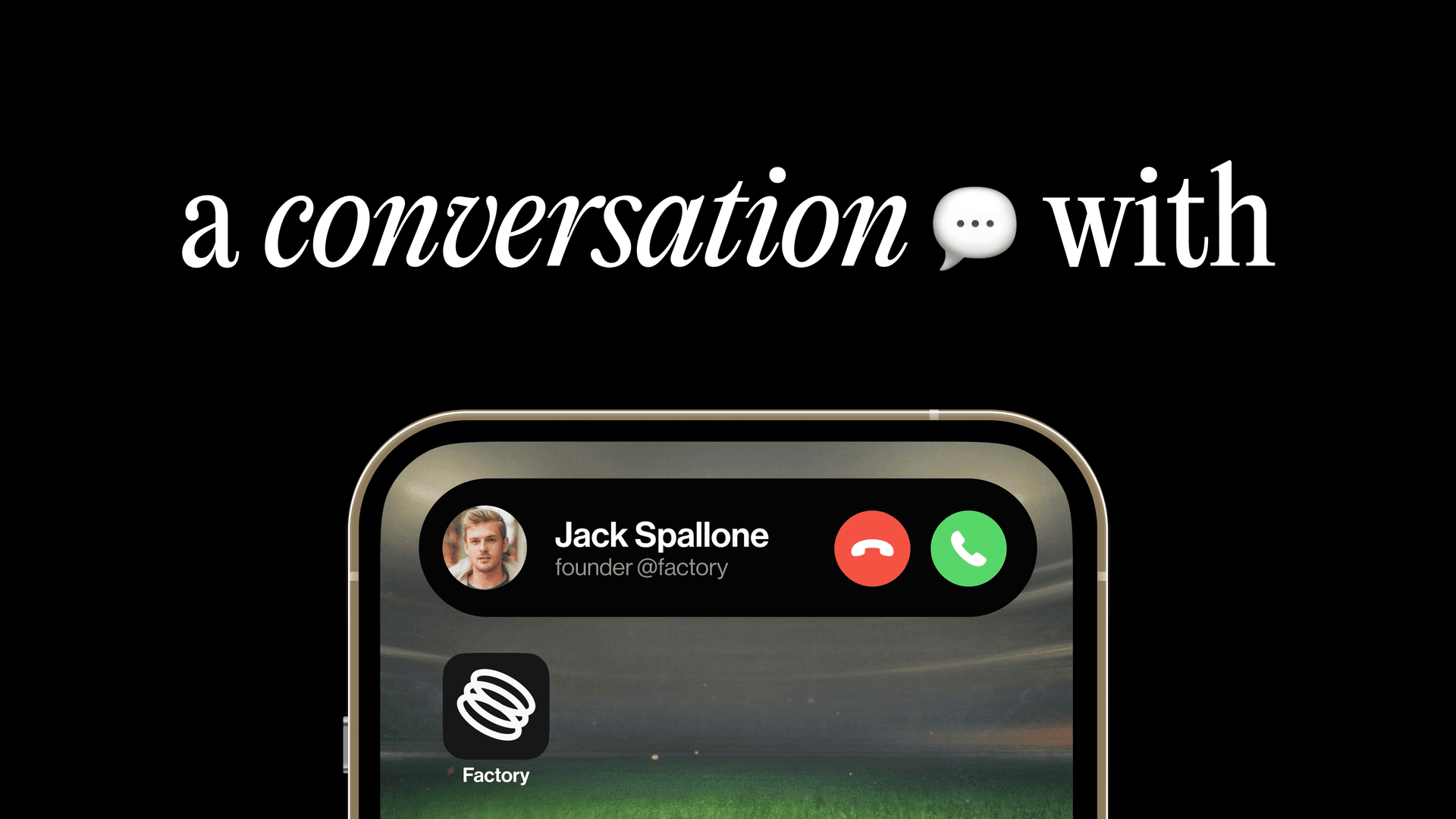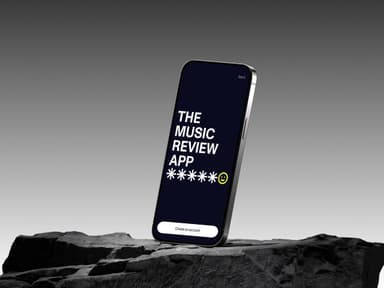
In 2016, the Berklee School of Music hosted an invite-only event in New York City for music industry insiders as part of the Open Music Initiative. The goal? Figure out how to leverage blockchain technology to ensure fair compensation for all creators, performers and music rights holders across the industry. The result? A "bunch of fighting and arguing about what could work", according to Jack Spallone, co-founder of Factory and Oscillator Protocol.
Jack is no stranger to the music technology industry. His background at Resonate, ConsenSys (where he worked on Ujo), and HIFI Labs uniquely positioned him to not only provide valuable insights into the technological disruption happening in the music industry, but also set him up to launch his own startup in the space.
Factory is an app that connects people around their favorite music - a sort of letterboxd.com but for the music industry. Jack and his partner Andre noticed a lack of tangible ways for people to connect meaningfully about the music they listen to. We sat down for a conversation about Factory, the future of music, and its colorful past. Here's that conversation:
Not right now, apart from wallet as an authentication option. For now, we want to be the best music review app available, and being onchain isn't an obvious requisite for that. Long term we have plans to bring in data portability and issue a wallet for all users, but for now, Factory is a regular consumer app. We think that's the most efficient way to grow at this time. We are currently out on the web and will soon have the app in iOS and Android app stores.

And what is it, exactly?


Factory lets you share the music you're listening to with your social circle and keep a record of your entire music journey. It is Letterboxd or Goodreads, but for music. The music review app.

That's awesome! And not to double down too much on the web3 point, but it's interesting that the app isn't web3 because you have so much experience building there. If you don't mind, I'd love to ask a bit more about the evolution of that space? It's been fascinating to watch it evolve and I know you were intimately connected.
(laughs) That's for sure. Blockchain, crypto, web3 for music… it's been a wild ride.

How did you get involved?
My journey in music started organically. While in college, I managed artists and booked local shows. As blockchain technology emerged, I noticed few people understood both the music industry and this new tech. This realization led me to the music co-op Resonate and then ultimately to join ConsenSys in early 2017. There, I had the incredible opportunity to work with RAC, who, after winning a Grammy, approached us with the idea of releasing his album onchain. This collaboration kicked off an amazing journey where we explored onchain primitives with price discovery, DAOs and social tokens, NFTs, and a lot of things that became 'firsts' for music and Ethereum.

Something that has been clear to me from hearing you talk previously about this space is how a lot of the wider initiatives happening in Ethereum during this time (pre-2020) were actually tied to music use cases.
Absolutely. Bonding curves, for instance, were actually conceived at Ujo by Simon de la Rouviere. The initial goal behind them was to help figure out how to price media (like, how do we price things that are infinitely reproducible at no cost). Simon wrote about them after the 2017 RAC release. RAC had an album coming out in May 2020 and we wanted to release a limited supply on Cassette, using a bonding curve with tokens to redeem the physical good, for price discovery. That led us to Jacob Horne, who worked on Saint Fame, which used bonding curves (similar to $SOCKS). Zora, which we now know as a digital creator platform, started as a physical redeemable goods store. The first drop they ever did was actually that RAC cassette tape, or $TAPE. There's honestly just so much lore when you run it back. The first AMM contracts for Uniswap were written by someone who worked at Ujo, and who also co-founded Optimism. Some of the early code that went into MetaMask was built for an early Ujo prototype - the space at the time was so small. Today, most people think music and crypto didn't converge until music NFTs.

Ha yes, let's talk about NFTs. I don't think we can't not talk about them?
Yeah. NFTs were such a weird phase for music and crypto. There was so much hype around them, but I often joke that they made me dumber. Artists made money and that was cool, but NFTs didn't solve any problems on the licensing or rights side, which historically was more of my focus with music and crypto. Combine that with the reality that a lot of the volume that was happening there was more related to speculation vs actual fandom. If connecting artists and fans, and deepening those connections was a metric we strive for, then we can safely say now that we under-delivered in the first iteration of Music NFTs from 2020-2023ish. The hygiene of the metadata around them was very irresponsible, too. There were large inconsistencies between platforms and token contracts. As for composable, cross-platform benefits, everyone stored data differently, too. Was it on IPFS, or was it actually just on a platform's database? Perhaps the major question that didn't have a concrete answer: what exactly were you buying when you bought a music NFT? The lack of unanimity of this prevented wider music adoption, ultimately.

NFTs got a lot of attention, but like many other "web3 waves", I think it's questionable whether they actually moved the needle when it came to tangibly experimenting with using the technology.
Oh, absolutely, and that was the opportunity that was left. NFTs captured a market of people wanting to spend money on things they weren't exactly clear what to do with. We used that to think about what could be done differently to make the process better.

Tell me more about that.
We think that what was missing with [music] NFTs is that they weren't designed to be permanent, platform-less artifacts. Thus, they didn't connect artists and fans in meaningful ways that you couldn't achieve without crypto. Users and artists would benefit from having data that connects them together and is not owned or held by a platform, but NFTs didn't do any of that. In hindsight, music NFTs were all about making artists more money. I think that is very important and worthwhile, but the implementations were short-sighted in that the byproducts of composability were largely missed or ignored.

And that's what you're working on?
Well, the underlying protocol behind Factory, Oscillator, is our approach to solving data portability with user-level social data. For Oscillator and music our position is that your listens, likes, playlists, and artist follows on platforms is all your data—you should be able to bring that around with you, artists should be able to access it without a platform's permission, and developers should be able to build on it with a user's permission. The data itself does not need to be onchain in every instance, but by using smart wallets for identity and onchain incentives for platforms we can enforce portability. We will be announcing more about Oscillator and our plans in early 2025.

That's awesome. And so tell me, we've talked a lot about data, what about copyright? Why didn't you want to pursue that any further?
First of all—my entire career was born out of the idea of blockchain automating royalty payments and programmatic music licensing. If I've learnt anything, it's that anyone who touches music copyright walks into a contentious room where they rarely have any leverage. Every successful online music provider today has had to settle at some point over infringement in their past. Even if you get access to music files from rights holders, with their permission, and you offer that to other people you're required to pay royalty collecting organizations (even if you can or would rather pay the rights holders directly), and if not, are susceptible to copyright damages. Short of changing actual statute about how music royalties can be paid out, onchain royalty automation cannot exist without, at best, being redundant. Long term, I still believe this will happen, but I am not waiting for it. I've been turned on by what else we can do with crypto, and am pursuing that in a way with Factory and Oscillator that yes, do not touch music playback or the copyright itself, as a means of not 'needing permission' or costly licenses (lest we infringe) to operate. Factory is enabling us to build meaningful experiences for users to create data (music reviews) that are high signal for artists and the industry as a whole, and also something that the user cares about and would find value in not having tied to just one platform (Factory). Because we are working to make this portable data via Oscillator, we are building an open, referenceable, knowledge base of all music related artists and release data, too. On a long enough time horizon, and if successful, this could be well suited to act as a foundational element to the original payment and licensing dream after all.

What's next on the product roadmap?
We're shipping incredibly fast with Factory. If you love music, just go check it out at factory.fm. We have a very simple goal: be the best music review app. With the iOS and Android releases coming early in 2025, we are going to be putting a big emphasis on user growth. With Oscillator, we will be releasing our litepaper any day now and will have some APIs for anyone to play around with the public music data.

What's your biggest growth challenge right now?
Well, right now the main problem is just that the app isn't in the App Store. As soon as it will be, it'll be pedal to the metal. We're using a lot of organic growth and paid growth playbooks right now.

It seems like music tech platforms have one of two options: they either focus on getting the creators on board first, or the fans.
Yeah. And what I've noticed is that a lot of people say they want to build for creators, and sure, that sounds nice and altruistic, but what often ends up happening is that creator platforms build for creators and either don't solve for fan/demand side experience or they do and then turn around and start charging those same creators to access features on the platform—when the platform couldn't have been built without them in the first place. There's a lot of feel good altruism thrown around in the space. The biggest thing we can solve for is distribution for creators. I realized this after having been in the space for so long and not being focused on that. Frankly think a lot of us in web3 have to take accountability for over-indexing on the tech and just assuming people would come - that did a lot of damage. This tech, decentralization, is egalitarian in nature and changes the internet's owner vs creator class dynamic, so it made sense to market our goals to the artists, creators, and educate them first. However, we need to match the demand they have elsewhere, and while we have finally overcome the burden of UX and costs with better wallets and scalability, we still haven't brought that demand, that distribution. All that to say, For Factory, we're focused first and primarily on mass scale distribution now through growing our user base. If we can onboard 1 million users to a music review app, we will then have their trust to give them wallets, educate them on a future where user data belongs to users, is portable, and the infinite amount of experiences that can be created from that which would not have been possible otherwise.

Thanks for your time Jack and for your enthusiasm! Where can users test it out?
Thank you, Abi. Factory.fm — THE music review app.!

Awesome, and how should people get in touch with you?
I'm pretty active on Twitter, always happy to connect there!

Thanks for your time, Jack.
Appreciate it!

⟐
We hope this conversation brought you fresh insights and a dose of inspiration.
If you'd like to be in the loop for upcoming discussions, feel free to connect with us to receive notifications.
Stay tuned!